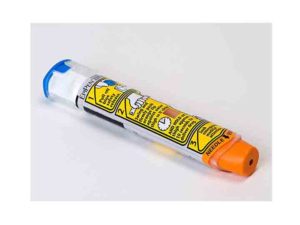Frequently asked questions on Anaphylaxis
Q1. What is anaphylaxis?
A. Anaphylaxis is a severe, life-threatening allergic reaction. The term anaphylaxis was first proposed by physiologist Charles Robert Richet and Paul Portier in the year 1902. “Ana” means “against” and “phylaxis” meaning “protection”. Urgent attention is needed to save the life of the individual who is suffering from anaphylaxis.
Q2. Is anaphylaxis common?
A. The exact incidence of anaphylaxis is unknown. Anaphylaxis is often underreported, underdiagnosed. The lifetime prevalence may be as high as 2 percent.
Q3. What are the causes of anaphylaxis?
A. Causes of anaphylaxis include:
-
Foods
including peanuts, tree nuts, fish, shellfish, cow’s milk, soy products, eggs and wheat.
-
Insect stings
including honeybees, yellow jackets, fire ants, hornets and paper wasps.
-
Medication
including β-lactams like penicillin, Nonsteroidal anti-inflammatory drugs (NSAIDs) like aspirin and ibuprofen Biologic modifier.
- Blood transfusion: – Anaphylaxis can occur in approx 1 in 20,000 to 1 in 50,000 transfusions.
-
Natural Rubber Latex
including gloves, intravenous tubing, syringes, catheters and condoms etc.
-
Radiocontrast media.
Q4. What are the symptoms of anaphylaxis?
A. Generalized urticaria and angioedema are the most common manifestations of anaphylaxis
Symptoms of anaphylaxis include
- Throat: Itching, tightness in the throat, hoarseness of voice.
- Skin: Itching, hives/ Urticaria, redness, swelling, angioedema.
- GIT: Vomiting, diarrhea, cramp in the abdomen.
- Lung: Respiratory difficulty/shortness of breath, cough, wheeze.
- Heart: Weak pulse, dizziness, reduced BP.
Q5. Most important treatment of anaphylaxis?
A. Anaphylaxis is a medical emergency. It can be fatal if left untreated. If someone has symptoms of anaphylaxis, you should: Use an adrenaline/epinephrine auto-injector. Give another adrenaline injection after 5-15 minutes if the symptoms don’t improve.
Q6. I had anaphylaxis to certain food. What to do next?
A. Avoidance of particular food is the most important. Consult with an allergist. Have your anaphylaxis action plan ready.
Q7. I had anaphylaxis previously to a food. Will it cause anaphylaxis in near future?
A. Most probably yes. Though it is seen particularly in children that milk allergy can subside when they grow but it is wise to avoid the particular food if you already suffered from anaphylaxis.
Q8. What is Adrenaline autoinjector?
A. Adrenaline autoinjector is life saving in anaphylaxis. If you suffered from an episode of anaphylaxis then you have carry Adrenaline auto-injector all the time with you.
Q9. My child had anaphylaxis. What I have to do?
A. If your child had anaphylaxis then inform all key personnel about the condition. Consult with the school teacher and tell them that the child had anaphylaxis to a certain substance. Always have the action plan ready and have adrenaline autoinjector.
Q10. I just suffered from anaphylaxis, adrenaline autoinjector is given. Now I am ok. Whether I have to still attend hospital?
A. Yes. You have to go to the nearest hospital for observation of at least for 4 hours.
Q11. Can anaphylaxis be prevented?
A. If you have an allergy to a particular substance then avoidance of the substances are the best preventive measure to avoid allergy. But in spite of the best effort, an individual may come in contact with the allergen.
Q12. Can anaphylaxis be cured?
A. No.




